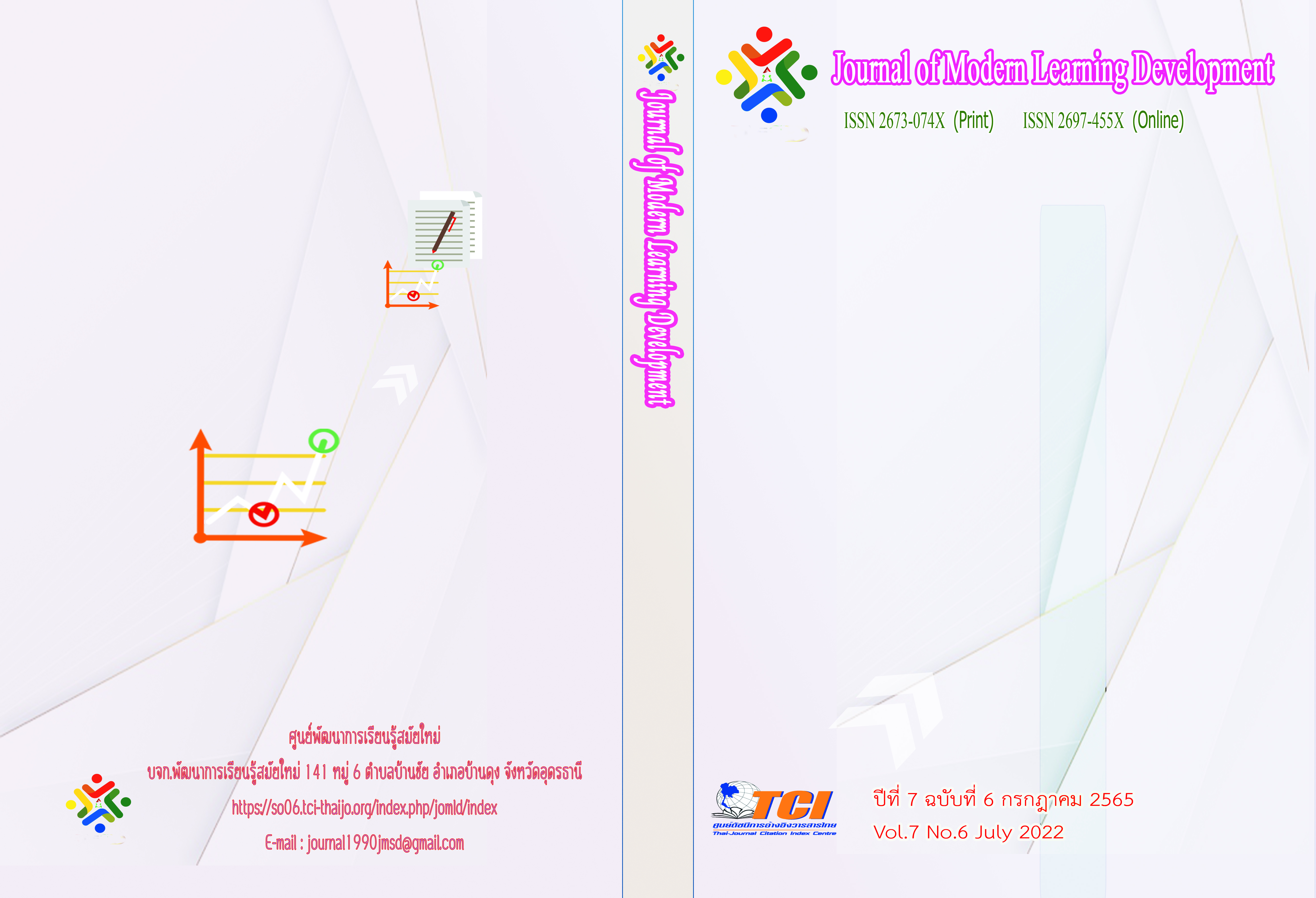The Needs of Stakeholder Participation in Pedagogy During the COVID-19 Pandemic
Main Article Content
Abstract
The purposes of this research were to explore the priority needs of stakeholder participation in online teaching during the COVID-19 pandemic of Samortnongpateep school. Which is a small school and secondary school. Population consisted of directors, deputy directors, head of teaching group, teachers, students, parents, alumni and supervisor from school. The research instruments used in this study were a five-point rating-scale questionnaire. The data collected in this study were analyzed by means of frequency, percentage, mean, standard deviation, and Priority Need Index (PNImodified)
Results of the study revealed as follows: The overall results showed that in terms of the needs of stakeholder participation in online teaching during the COVID-19 pandemic. Group of students ranked first (PNIModified = 0.038), followed by Groups of external organizations, both public and private sectors (PNIModified = 0.034) Parents and Alumni groups (PNIModified = 0.029) and School administrators (PNIModified = 0.020) and Group of teachers (PNIModified = 0.017) respectively. When study the participation in online teaching found that participation with schools in conducting and monitoring assessments is of highest needs (PNIModified = 0.068), followed by the participation with school drives decisions that affect student achievement (PNIModified = 0.064).
Article Details
References
ชูชาติ พ่วงสมจิตร. (2560). การสร้างความสัมพันธ์ระหว่างโรงเรียนกับชุมชน. Veridian E-Journal
มหาวิทยาลัยศิลปากร, 10 (2), 1342-1354
นันทกิตติ แก้วกล้า. (2545). การบริหารแบบมีส่วนร่วม. กรุงเทพมหานคร : สำนักพิมพ์บรรณกิจ.
นิภา อินทะวงศ์. (2548). การบริหารแบบมีส่วนร่วมในโรงเรียนมัธยมศึกษา สังกัดสำนักงานเขตพื้นที่การศึกษาลำพูน เขต 1. วิทยานิพนธ์ครุศาสตร์มหาบัณฑิต. สาขาการบริหารการศึกษา. บัณฑิตวิทยาลัย: มหาวิทยาลัยราชภัฏลำปาง.
นิเวศน์ วงศ์สุวรรณและอินถา ศิริวรรณ. (2560). การบริหารแบบมีส่วนร่วม The Participative Management. วารสารมหาจุฬาวิชาการ. 4 (1), 176-187.
สำนักวิชาการและมาตรฐานการศึกษา สำนักงานคณะกรรมการการศึกษาขั้นพื้นฐาน กระทรวงศึกษาธิการ.
(2564). การบันทึกข้อมูลการประเมินพัฒนานักเรียนที่จบหลักสูตรการศึกษา. ออนไลน์. สืบค้นเมื่อวันที่ 5 กุมภาพันธ์ 2565. แหล่งที่มา http://academic.obec.go.th/article.php
มณฑา จำปาเหลือง และคณะ. (2558). รูปแบบการมีส่วนร่วมของผู้มีส่วนได้ส่วนเสียทางการศึกษาในการสร้าง
บทเรียนภูมิปัญญาท้องถิ่นด้านวิทยาศาสตร์ของจังหวัดเพชรบุรี* ฉบับภาษาไทย. Veridian E-Journal มหาวิทยาลัยศิลปากร สาขามนุษยศาสตร์ สังคมศาสตร์ และศิลปะ, 8 (3). 990-1005
เมตต์ เมตต์การุณ. (2547). การบริหารจัดการศึกษาแบบมีส่วนร่วม: ประชาชนองค์กรปกครองส่วนท้องถิ่น และ ราชการ. กรุงเทพมหานคร: บุ๊ค พอยท์.
เสกสรรค์ สนวา, พงศ์สวัสดิ์ ราชจันทร์, วรฉัตร วริวรรณ, จิราพร บาริศรี, และนภัสภรณ์ ภวภูตานนท์ ณ มหาสารคาม. (2564). การปรับตัวด้านการเรียนการสอนภายใต้ยุควิถีใหม่ของนักศึกษาสาขาวิชารัฐประศาสนศาสตร์ คณะนิติรัฐศาสตร์ มหาวิทยาลัยราชภัฏร้อยเอ็ด. วารสารการบริหารการปกครองและนวัตกรรมท้องถิ่น, 5 (3).1-14.
วิชิตร์ แสงทองล้วน. (2560). แนวทางการบูรณาการการทำงานร่วมกันของหน่วยงานภาครัฐ ทั้งส่วนกลาง ส่วนภูมิภาค และท้องถิ่นในพื้นที่จังหวัด. ออนไลน์. สืบค้นเมื่อวันที่ 5 กุมภาพันธ์ 2565. แหล่งที่มา
http://www.dsdw2016.dsdw.go.th › PDF
วิทยา วาโยและคณะ. (2563). การเรียนการสอนแบบออนไลน์ภายใต้สถานการณ์แพร่ระบาด ของไวรัส COVID-19. วารสารศูนย์อนามัยที่ 9, 14 (34), 285-298.
UNESCO. (2020). Preliminary results of the survey on school reopening. Online. Retrieved
December 18, 2020. from: https://unescochairghe.org/resources/themes-covid- 19/preview-survey-school-reopening
Janvi Ramani. (2013). School Stakeholders. Online. Retrieved February 5,2022. From:
https://sites.google.com/site/janviramani47/school-stakeholders
Project Management Institute. (2013). A Guide to the Project Management Body of
Knowledge. (Fifth Edition). Newtown Square, Pennsylvania


